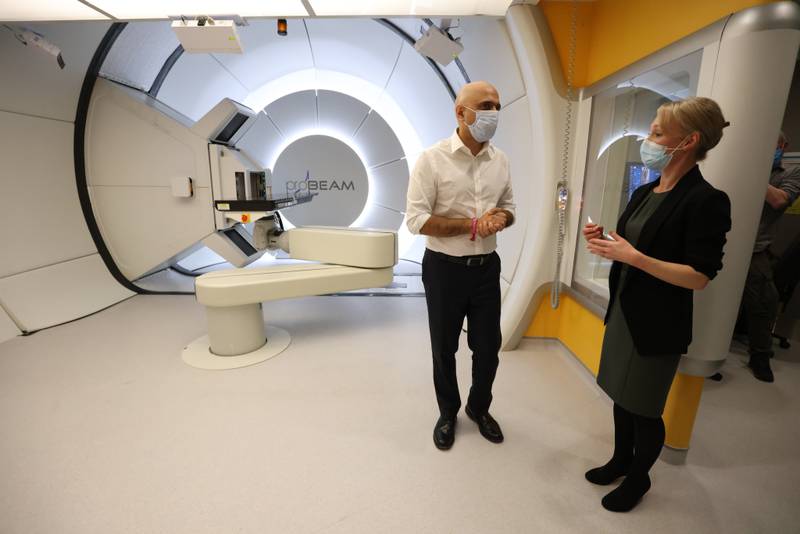Screening at shopping centres planned as UK declares 'national war on cancer'

The UK Health Secretary has set out his long-term vision for a “national mission” to improve cancer prevention and diagnosis, with plans for screening sites in shopping centres and football stadiums.
Sajid Javid said he wanted cancer services to learn from the rapid scientific progress made during the coronavirus pandemic, and added England needed to “go further” in improving cancer treatment, including looking into creating vaccines to treat the disease.
Mr Javid spoke of his own personal pain when he lost his father to colon cancer. He told the north London audience: “I lost my dad to this vicious disease and I know all too well the grief and the heartbreak that this brings.
“This painful experience also pressed upon me that when it comes to cancer, there isn’t a moment to spare. “Who knows? If he had been diagnosed a bit earlier, he may still be with us today.” The health secretary said there are more than 166,000 cancer deaths per year in the UK — a “daunting statistic” — with one person diagnosed with the disease every 90 seconds.
In a bid to reduce those numbers, the Conservative minister said he wanted to boost efforts to prevent cancer, with programmes to encourage cutting smoking and lowering obesity rates and alcohol consumption.
Early diagnosis of cancer would also be vital for cutting the morbidity rate, Mr Javid said, and set the goal of exceeding the National Health Service's aim making of 75 per cent of diagnoses at stage one and stage two by 2028.
“The majority of deaths from cancer come because we sadly catch it too late, like my father,” he said. “Detecting the disease early can save time, save money but, most importantly, can save lives.”
He said new one-stop-shop community diagnostic centres are predicted to produce two million scans in their first year of operation, while mobile vehicles with diagnostic equipment on board have already been rolled out with “phenomenal” results.
Mr Javid said the we-will-come-to-you approach has helped boost early diagnosis of lung cancer by 80 per cent, up from less than 30 per cent before the roll-out. Taking questions from reporters, he confirmed that he saw a future in which people take it upon themselves to be screened.
Asked whether people could potentially turn up to community diagnostic centres and ask for “scans on the spot”, Mr Javid replied, “Yes, [but] not quite yet, because these one-stop-shops, these community diagnostic centres, we have just set up.
“They are going at a record pace — we have opened up, I think, 70 or so within a year. We are going to get to 100 certainly by the end of the year, maybe more, and as I mentioned, 400,000 scans and diagnostics already.
“But I would like to see a future for many more referrals, that to get those scans that people need, that they don’t necessarily need to go through their GP.”
Mr Javid said that while some centres could be attached to hospitals, others will be set up in shopping centres and football stadiums.
“[Places] that people might go to for other purposes but the key is to have something as accessible as possible.” He said he wanted to “explore every avenue for how vaccines can help us fight cancer”.
He said his three daughters had been vaccinated against cervical cancer, along with 80 million people worldwide, and that the HPV shot could help eradicate the cancer “in my lifetime”. “Although it might be someway on the horizon, there is also the potential, I think, to develop vaccines for other forms of cancer too,” he said.
But he admitted it would be “difficult” as he pressed for research to be advanced in applying mNRA vaccine research to forms of cancer.
The 24-minute speech also included Mr Javid laying out plans to tackle inequalities in health care across the country and abolish disparities in diagnosis times. He said the call for evidence will be used to inform a final strategy expected later this year, which ministers hope will make England’s cancer care system “the best in Europe”.
Launching on Friday and running for eight weeks, it is open to the public and seeks input from cancer patients, their relatives and NHS workers.
There were 50,000 fewer cancer diagnoses across the UK since the start of the pandemic, which could indicate an increase in advanced cases that are harder to treat.
The Department of Health and Social Care said the plan would aim to boost the cancer-care workforce and increase research into technology that helps to detect the disease in its early stages.
The Minister for Primary Care, Maria Caulfield, said: “Half of us will have cancer at some point in our lives, and many more will have to support someone close to them who has it. “We want to have the best cancer care in Europe and this call to evidence will help us develop a plan to achieve this.
“We want to hear from you — cancer patients, relatives and NHS staff — to see how we can best move forward to deliver better care and treatment.”
Cally Palmer, national cancer director for the NHS, said: “Despite the pandemic and thanks to the huge efforts of our staff, cancer services have remained a priority with well over two million checks in the last year alone and tens of thousands of people starting life-saving treatment every month.
“From one-stop shops for vital checks and revolutionary treatment options like proton-beam therapy, we will continue to go further and faster in our mission to save more lives and ensure England is world-leading in cancer care.”
